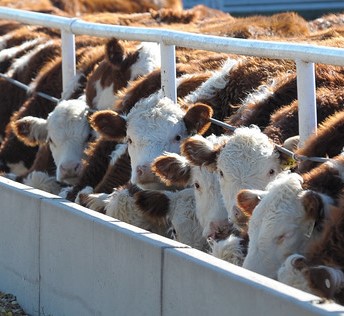A new report card on the nation's largest grocery chains shows that most are getting a failing grade on their policies toward eliminating routine antibiotic use in the store-brand meat and poultry they sell.
The Superbugs in Stock report, produced by a coalition of public health, animal welfare, and food safety groups, finds that, of the nation's top 12 grocery chains, 8 received an "F" grade for their antibiotic policies and meat sourcing practices for meat and poultry products sold under their private labels. The highest grade awarded was a "C."
Previous reports by the Antibiotics Off The Menu coalition have focused on US restaurant chains and their policies and practices regarding antibiotic use in the beef they serve, with the aim of encouraging the industry, and consumers, to put more pressure on meat suppliers to reduce antibiotic overuse in beef cattle. Consumer pressure has been a significant factor in getting the poultry industry to significantly reduce antibiotic use.
The authors say grocery stores, where roughly 50% of meat products sold in the United States are bought, are another venue where pressure can be applied.
"Grocery stores are a primary way that people purchase meat…and they're one of the main ways consumers get information about the meat that they're buying," report contributor Matt Wellington of the US PIRG (Public Interest Research Group) Education Fund, told CIDRAP News. "They can have a real impact here if they step up and commit to sourcing meat raised without overusing antibiotics."
Approximately two thirds of the medically important antibiotics—those antibiotics that are also used in human medicine—sold in the United States are used within the livestock sector. But they are often used for more than simply treating sick animals. While US meat producers aren't allowed to use medically important antibiotics to promote animal growth, they are allowed to use them for disease prevention, a practice that critics say contributes to the development and spread of antibiotic-resistant bacteria and covers up for practices that increase the disease risk for animals.
Lack of policies, reporting, verification
The report analyzes the antibiotic use policies and practices of grocery chains and grades them on steps taken to reduce antibiotic overuse in their private label meat products, which is where the authors say the chains have the most oversight and leverage. According to the report, private-label meat products accounted for 25% of total meat products on shelves across the grocery industry in 2021.
The grades were based on the following criteria:
- Whether the chains had a meaningful, publicly available policy that prohibits the use of medically important antibiotics for growth promotion or disease prevention in meat sold through their private labels
- The strength of the language in the policy
- Whether the policy applied to all major meat groups (beef, turkey, chicken, pork)
- Whether the policy is tied to a deadline and linked to broader animal welfare commitments.
The companies were also graded on their responses to a survey that asked additional questions about antibiotic use policies.
Lead author Annette Manusevich of World Animal Protection said that, to get an "A," grocery chains would need to have an animal welfare policy that requires all suppliers of private-label meat and poultry to have a clear policy to eliminate medically important antibiotics for disease prevention, a policy that prohibits close confinement of animals and painful procedures, a requirement that meat suppliers track and report antibiotic use, and independent third-party verification.
"We were looking for more transparency, more auditing, and more clear policies that really stress the elimination of medically and medically important antibiotics for disease prevention purposes," she said.
Few of the grocery chains met those criteria. Of the 12, Target received the highest grade, earning a "C" with a time-bound antibiotic use policy that applies to each species of animal products sold under their private label and is linked to broader animal welfare concerns. Ahold Delhaize—the parent company of Stop and Shop, Food Lion, and other grocery chains—received a "C-" for a policy that applies across animal species.
But Target didn't provide any information on what portion of meat it sells through its private labels meets its antibiotic use commitments, while Ahold Delhaize's policy had no timeframe for implementing the policy across its meat and poultry supply chain. And neither chain has taken steps to verify whether its meat suppliers are complying with their policies.
Among the other chains reviewed, Costco and Meijer received a "D," and eight—including Kroger, Aldi, Walmart, and Trader Joe's—received an "F." The report found that these companies, some of which are among the top five in the country based on annual revenue—had no publicly available policy on antibiotic use in meat products.
"We believe the grocery stores have a vital role to play in building a more humane and sustainable food system that protects our health and our resources and animals as well," Manusevich said. "Evaluating them has shown that there is a great deal of improvement that can be made in this sector regarding antibiotic policies."
Providing a 'kick-start' for grocery chains
The report argues that clear policies and third-party verification by grocery chains on antibiotic use in their meat supply is important because while some meat products sold in grocery stores have labels such as "Raised Without Antibiotics" or "No Antibiotics Ever," and consumers typically pay more for those products, those labels don't have an enforcement mechanism. In fact, a recent study found that, in 42% of Raised Without Antibiotics-certified feed yards at a single cattle slaughter facility, at least one animal tested positive for antibiotics.
"The products that grocery stores stock, the information provided in stores, and even the placement of products often dictates the purchasing decisions of the consumer," the report states. "It is their responsibility to provide consumer safe food options, and meat and poultry products that contribute to the rise and spread of antibiotic-resistant infections are misaligned with this obligation."
Going forward, the report calls on grocery chains to make firm, timebound commitments to phase out routine antibiotic use for disease prevention across all meat supply chains, work closely with meat producers, improve data collection regarding how meat suppliers are using antibiotics, and share those data with the public. They also urge consumers to encourage grocery chains to sell only meat raised without routine use of antibiotics.
Wellington says the goal is to "kick-start" grocery chains into understanding the importance of antibiotic resistance, which recent research estimates was directly linked to nearly 1.3 million deaths in 2019 and is getting worse.
"We're talking about preserving the foundations of modern medicine, and they have a role to play in doing that," he said.
























